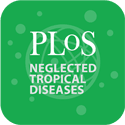
PLoS Neglected Tropical Diseases
Scope & Guideline
Transforming research into solutions for tropical diseases.
Introduction
Aims and Scopes
- Epidemiology and Public Health:
Research on the distribution, determinants, and control strategies of NTDs, including surveillance, risk factors, and socio-economic impacts. - Pathogen Biology and Host Interactions:
Studies investigating the biology of pathogens causing NTDs, their interactions with hosts, and mechanisms of pathogenicity. - Diagnostic and Therapeutic Innovations:
Development and evaluation of new diagnostic tools and therapeutic interventions aimed at improving the management of NTDs. - Vector Biology and Control Strategies:
Research on vectors responsible for the transmission of NTDs, including their ecology, behavior, and control measures. - Community Engagement and Implementation Science:
Studies focusing on community perceptions, attitudes, and practices related to NTDs, as well as the effectiveness of public health interventions.
Trending and Emerging
- One Health Approach:
The integration of human, animal, and environmental health perspectives is increasingly emphasized, recognizing the interconnectedness of NTDs and zoonotic diseases. - Climate Change Impact:
Research exploring the effects of climate change on the transmission dynamics of NTDs is emerging as a critical area, highlighting the need for adaptive public health strategies. - Machine Learning and AI Applications:
The use of machine learning and artificial intelligence in predicting outbreaks, analyzing epidemiological data, and improving diagnostic accuracy is a growing trend. - Community-Based Interventions:
There is a rising focus on participatory research and community engagement strategies to enhance the effectiveness of NTD control and prevention efforts. - Metagenomic Approaches:
Studies utilizing metagenomic and genomic techniques to understand pathogen diversity and resistance patterns are becoming more prevalent, offering insights into the complexities of NTDs.
Declining or Waning
- Traditional Medicinal Approaches:
There has been a noticeable decrease in research focused on traditional medicine for treating NTDs, possibly due to a growing emphasis on evidence-based and scientifically validated treatments. - Historical Epidemiological Studies:
Research primarily focused on historical data or retrospective analyses of NTD trends has waned, as the journal increasingly prioritizes contemporary studies with immediate public health relevance. - Single-Disease Focus:
Studies addressing single NTDs in isolation are declining in favor of integrated approaches that consider co-infections and the interactions between multiple diseases.
Similar Journals
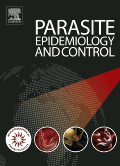
Parasite Epidemiology and Control
Elevating understanding, enhancing control of parasites.Parasite Epidemiology and Control is a premier open-access journal published by Elsevier, dedicated to advancing the understanding of parasites and their impact on public health. Since its inception in 2016, the journal has established itself as a prominent publication in the fields of epidemiology, infectious diseases, and parasitology, achieving a commendable classification of Q2 in these categories as per 2023 metrics. With its ISSN 2405-6731, the journal serves as a vital resource for researchers, practitioners, and students, offering rigorous, peer-reviewed articles that illuminate parasite-related epidemiological trends and control strategies. Based in the United Kingdom, Parasite Epidemiology and Control actively promotes open access, ensuring that crucial research findings are readily accessible to a global audience, thus enhancing collaborative efforts in tackling parasitic diseases. The journal's impact is reflected in its Scopus rankings—ranking 17th in Parasitology among 79 journals, 47th in Epidemiology among 148, and 121st in Infectious Diseases among 344—underlining its significance in the scientific community. Join us in exploring this critical field and contributing to the fight against parasitic diseases through innovative research and shared knowledge.
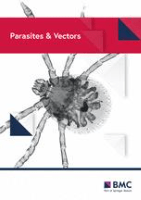
Parasites & Vectors
Fostering collaboration for a healthier tomorrow.Parasites & Vectors is a leading open access journal dedicated to the dissemination of high-quality research on the vectors of infectious diseases and their parasitic agents. Published by BMC in the United Kingdom, this journal has been at the forefront of its field since its establishment in 2008, contributing to our understanding of vector-borne pathogens through its rigorous peer-reviewed articles. With a notable impact factor and categorized in the top quartile (Q1) in both Infectious Diseases and Parasitology, it is an essential resource for researchers, professionals, and students worldwide. The journal ranks impressively within various categories, holding a position of 7th out of 194 in Veterinary General Veterinary and 12th out of 79 in Immunology and Microbiology Parasitology, indicating its significant contribution to the sciences. Accessible to all, Parasites & Vectors supports the global pursuit of knowledge in epidemiology and disease control, making it an indispensable platform for sharing innovative findings and fostering collaboration within the scientific community.

Prion
Connecting global minds in prion science.Prion is a pioneering open-access journal published by Taylor & Francis Inc, dedicated to the dynamic field of prion research. With an ISSN of 1933-6896 and an E-ISSN of 1933-690X, this journal serves as a vital platform for the dissemination of cutting-edge findings related to prion biology, infectious diseases, and neurodegenerative disorders. Since its transition to open access in 2019, Prion has become increasingly accessible to a global audience, encouraging collaboration and knowledge sharing among researchers, professionals, and students. The journal holds a notable impact in various categories, with its 2023 quartile rankings showcasing Q3 statuses in Biochemistry and Cell Biology, Q4 in Cellular and Molecular Neuroscience, and Q2 in Infectious Diseases. Despite a lack of H-index, its diverse research contributions are underscored by its Scopus rankings, which highlight its significance within the biomedical field. With published works spanning from 2007 to 2024, Prion continues to be a critical resource for those engaged in the investigation of prion-related phenomena and their implications on health and disease.
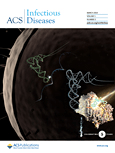
ACS Infectious Diseases
Elevating Research to Combat Infectious ThreatsACS Infectious Diseases is a premier journal in the field of infectious diseases, published by the American Chemical Society. With an impressive Impact Factor that places it in the Q1 category for Infectious Diseases in 2023, the journal serves as an essential resource for researchers, healthcare professionals, and students dedicated to the study of infectious agents and their impact on public health. Established in 2015, the journal is committed to publishing cutting-edge research that enhances our understanding of infectious diseases and fosters the development of innovative interventions. Although not an open access journal, it provides a platform for high-quality research that influences policies and practices in the field. With an address located at 1155 16TH ST, NW, WASHINGTON, DC 20036, ACS Infectious Diseases is an authoritative voice in advancing the science and practice of infectious disease management.
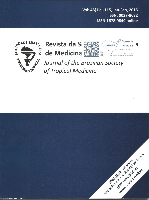
Revista da Sociedade Brasileira de Medicina Tropical
Pioneering insights in tropical and infectious diseases.Revista da Sociedade Brasileira de Medicina Tropical is a distinguished open-access journal published by the Sociedade Brasileira de Medicina Tropical, focusing on the critical fields of Infectious Diseases, Microbiology, and Parasitology. Since its inception in 1972, this journal has committed to disseminating impactful research that addresses pressing global health challenges, particularly in tropical and infectious diseases prevalent in Brazil and beyond. With a robust publication history, it has been recognized as a Q3 journal in esteemed categories, reflecting its valuable contributions to scientific literature and its ranking in various Scopus categories, including a notable position in Parasitology. Researchers, professionals, and students are encouraged to engage with its rich repository of research, which has been freely accessible since 1997, fostering a wide-reaching impact on public health strategy and scientific innovation.
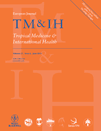
TROPICAL MEDICINE & INTERNATIONAL HEALTH
Bridging knowledge gaps in tropical medicine.Tropical Medicine & International Health is a distinguished journal published by Wiley, dedicated to the exploration and dissemination of cutting-edge research in the fields of infectious diseases, parasitology, and public health. With a robust open-access option, the journal facilitates the widespread sharing of information critical to addressing health issues in tropical and international settings. Since its inception in 1996, it has established a significant presence in the academic community, as indicated by its impressive ranking in various Scopus categories, notably positioned in the Q1 quartile for Parasitology and Q2 for both Infectious Diseases and Public Health, reflecting its high influence within these domains. The journal's commitment to advancing knowledge on health challenges prevalent in tropical environments makes it an invaluable resource for researchers, healthcare professionals, and students alike who are dedicated to improving global health outcomes.

Infectious Diseases
Fostering Global Collaboration in Infectious DiseasesInfectious Diseases, published by TAYLOR & FRANCIS LTD, is a leading academic journal dedicated to advancing research in the field of infectious diseases and microbiology. With an impressive impact factor and categorized in Q1 in multiple areas including Immunology and Microbiology, this journal serves as a critical platform for researchers, practitioners, and students to disseminate their findings and stay abreast of current advancements. The journal is recognized for its rigorous peer-review process and aims to foster innovation and collaboration across disciplines from 2015 to 2024. It boasts a robust Scopus ranking, positioning it favorably among the top-tier of journals in the relevant fields, making it an essential resource for anyone involved in infectious disease research. Access options are available, ensuring that the latest research is accessible to a global audience, thus emphasizing the journal's commitment to promoting knowledge and understanding in the ever-evolving landscape of infectious diseases.
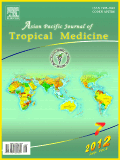
Asian Pacific Journal of Tropical Medicine
Empowering knowledge for a healthier tropical future.Asian Pacific Journal of Tropical Medicine, published by Wolters Kluwer Medknow Publications, stands at the forefront of research in the field of tropical medicine, contributing significantly to the global understanding of health issues prevalent in the Asian Pacific region. With an ISSN of 1995-7645 and an E-ISSN of 2352-4146, this esteemed journal has been an Open Access platform since 2011, ensuring that vital research is accessible to a broad audience. The journal boasts a commendable Scopus rank of 131 out of 636 in the General Medicine category, placing it in the 79th percentile and recognizing its influential contributions to the discipline. Based in Mumbai, India, the journal spans converged years from 2010 to 2024 and is categorized in the Q3 quartile for miscellaneous medicine as of 2023. Researchers, professionals, and students can leverage this journal to stay abreast of the latest findings and developments in tropical medicine, making it an indispensable resource in their academic and professional pursuits.

JOURNAL OF VECTOR BORNE DISEASES
Transforming insights into action against vector-borne diseases.JOURNAL OF VECTOR BORNE DISEASES, published by Wolters Kluwer Medknow Publications, is an esteemed peer-reviewed journal dedicated to advancing the understanding of vector-borne diseases, a significant concern in global health. Established in 2003, this open-access journal has fostered a rich repository of research, spanning clinical studies, epidemiology, and control strategies related to diseases transmitted by vectors like mosquitoes and ticks. With its impact continuing to grow, as evident from its Q3 quartile rankings in Infectious Diseases and Medicine (miscellaneous) categories in 2023, the journal provides a critical platform for researchers and healthcare professionals to disseminate findings that inform policy and practice. With the aim of highlighting contemporary issues and innovations in the field, it is vital for ongoing discussions and advancements in vector-borne disease management. Evaluation metrics from Scopus, although currently positioned in the lower percentiles, underscore the journal's importance as an emerging source of scholarly information in parasitology and immunology. By adhering to its open-access model since 2012, the journal ensures that its valuable content is readily accessible, facilitating widespread knowledge transfer and collaboration among scholars and practitioners alike.

TROPICAL BIOMEDICINE
Championing discoveries in infectious disease management.Tropical Biomedicine, published by the Malaysian Society of Parasitology and Tropical Medicine, is an influential journal dedicated to the field of infectious diseases and parasitology. Since its inception in 2005, the journal has aimed to advance scientific knowledge and foster research in tropical health, providing a vital platform for disseminating high-quality research findings, case studies, and reviews. With a Q3 ranking in Infectious Diseases and a Q4 in Parasitology for 2023, the journal plays an essential role in addressing the challenges faced in these fields, particularly in tropical and subtropical regions. Although currently not open access, its contributions are pivotal for researchers, healthcare professionals, and students dedicated to combating diseases prevalent in diverse ecological environments. By focusing on relevant topics and innovative approaches, Tropical Biomedicine seeks to enlighten and inspire the ongoing fight against tropical diseases, ultimately improving public health outcomes.